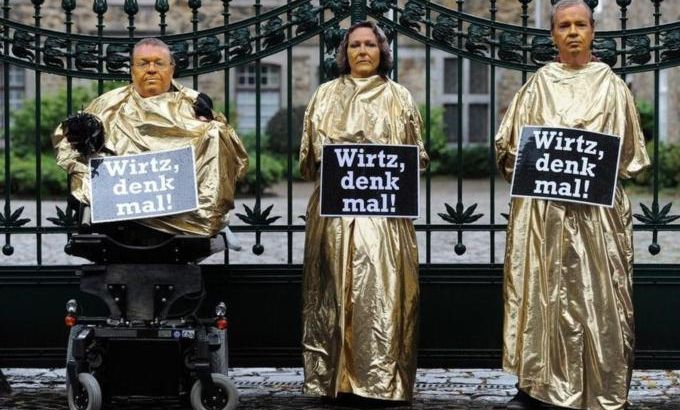Thalidomide victims say apology not enough
Victims say apology by German inventor of drug that caused severe birth defects in 1950s and 60s is too little too late.

Victims of thalidomide have said that an apology from Gruenenthal, the German inventor of the drug that caused birth defects in thousands of babies in the late 1950s and early 1960s, was too little, too late.
At a ceremony on Friday at which he unveiled a commemorative statue to victims, Harald Stock, Gruenenthal’s chief executive, said the company was sorry for what had happened to those affected.
Thalidomide was marketed internationally to pregnant women in the late 1950s and early 1960s as a treatment for morning sickness.
About 10,000 babies were born around the world with defects caused by the drug, mostly malformed limbs or missing arms or legs. Gruenenthal says it has paid roughly $629m to victims up to 2010.
“In the name of Gruenenthal … I want to take this opportunity to express our deep regret over the consequences of Contergan and our deep sympathy for the victims, their mothers and families,” Stock said at the ceremony in the western German city of Stolberg, where the company is based.
“We also ask for forgiveness for not reaching out to you from human to human for almost 50 years … We ask that you see our long speechlessness as a sign of the silent shock that your fate has caused us.”
‘Not really sorry’
Several thousand victims of thalidomide, sold in Germany under the brand name Contergan and elsewhere as Distaval, are still alive.
German thalidomide victims get a monthly pension of up to $1,406 from a trust to which Gruenenthal contributes.
An Australian woman whose daughter won a multi-million dollar settlement in July against Diageo Plc, the legal successor to thalidomide’s Australian distributor, said the apology was an insult.
“It’s the sort of apology you give when you’re not really sorry,” Wendy Rowe told the Australian Broadcasting Corporation
Lynette Rowe, now 50, was born without arms or legs after her mother took thalidomide for a month while pregnant. Her lawyers said Gruenenthal did not contribute to the settlement.
Referring to Stock’s statement of ‘silent shock’, Wendy Rowe said: “Our family couldn’t have gone into silent shock.
“We had to get up and face each day and every day and cope with the incredible damage that Gruenenthal drug did to Lyn and our family.”
The Rowe family’s legal firm called the drug manufacturer’s apology “pathetic”.
“It is too little, too late and riddled with further deceit,” they said.
Rowe’s settlement followed a $52m payment Diageo agreed to make in 2010 to 45 thalidomide victims in Australia and New Zealand, who sought help to cope with the mounting costs of care as they were living longer than expected.
‘Important first step’
“Having tried to remind them of their criminal behaviour across a negotiating table on several occasions, I didn’t think this company would ever make things right,” Geoff Adams-Spink, a British thalidomide victim, said.
“This is an important first step. The next is to compensate everyone damaged by their so-called ‘totally harmless’ drug,” said Adams-Spink, who heads the European Dysmelia Reference Information Centre, a support group for those with limb malformations attributable to thalidomide and other causes.
The cases have been closely watched in the US, where a complaint has been filed against GlaxoSmithKline, Sanofi-Aventis, Avantor Performance Materials and Gruenenthal, with several plaintiffs claiming their birth defects resulted from their mothers’ use of thalidomide.
The thalidomide scandal triggered a worldwide overhaul of drug-testing regimes and boosted the reputation of the US Food and Drug Administration, which refused to approve the drug.
Gruenenthal said it had acted to the best of its knowledge.
“In developing Contergan, Gruenenthal acted according to the scientific knowledge back then and fulfilled all industrial standards for the testing of new medication,” Stock said.
Many German thalidomide victims stayed away from the unveiling of Gruenenthal’s statue, which portrays a child with shortened arms, calling it a public relations stunt.
“The fact that Gruenenthal, a billion-euro company, is paying 5,000 euros [for the statue] is a slap in the face of every victim,” said the federal association of Contergan victims.
“This PR measure is supposed to signal to the public that the company still has Contergan on its agenda, without any serious effort to address the concerns of the people who have been permanently damaged.”